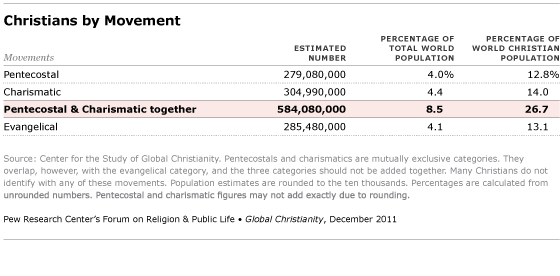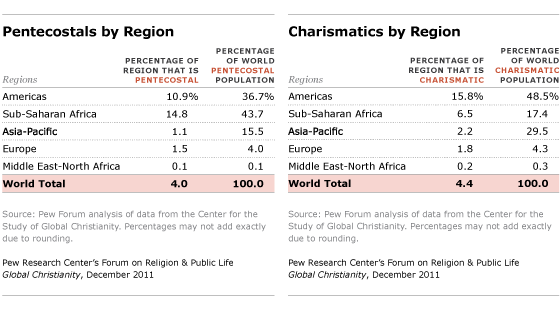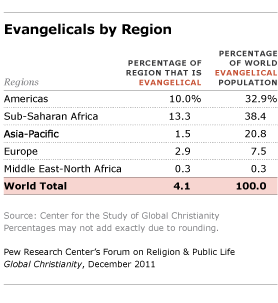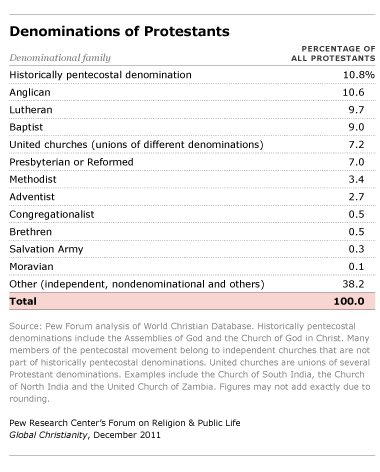
According to a Pew Forum analysis of estimates from the Center for the Study of Global Christianity (CSGC) at Gordon-Conwell Theological Seminary, there are about 279 million pentecostal Christians and 305 million charismatic Christians in the world. (For definitions, see Defining Christian Movements.) This means that, according to this analysis, pentecostal and charismatic Christians together make up about 27% of all Christians and more than 8% of the world’s total population.15 (As noted in the Executive Summary, these estimates are based primarily on numbers provided by Christian organizations and are derived differently from the other figures in this study, which are based mainly on censuses and surveys; see Methodology for Estimating Christian Movements (PDF) for more details.)

In addition, more than 285 million Christians are classified by the CSGC as evangelical, either because they belong to churches affiliated with regional or global evangelical associations or because they identify as evangelicals. Because many pentecostals and charismatics also are evangelicals, these categories are not mutually exclusive; the number of evangelicals should not be added to the number of pentecostal and charismatic Christians.

The Pew Forum’s analysis of CSGC data estimates that about eight-in-ten of the world’s pentecostals reside either in sub-Saharan Africa (44%) or in the Americas (37%). According to this analysis, 15% of the total population in sub-Saharan Africa is pentecostal, as is 11% of the population in the Americas. Nearly one-in-six (16%) pentecostals live in Asia and the Pacific, although only about 1% of the total population of the region is pentecostal.

Almost half (49%) of all charismatic Christians in the world live in the Americas, a region in which 16% of the population is charismatic. Nearly 30% of charismatics live in the Asia-Pacific region.
Sub-Saharan Africa has both the greatest concentration of evangelical Christians (13% of sub-Saharan Africa is evangelical) and the largest share of the world’s evangelicals (38%). About one-in-three evangelicals live in the Americas (33%) and roughly one-in-five reside in the Asia-Pacific region (21%).
The Center for the Study of Global Christianity collects membership data from Christian denominations around the world. Many churches in the Protestant category, as broadly defined in this report, can be considered independent, nondenominational or part of a denominational family that is very small or otherwise difficult to classify. However, Pew Forum analysis of data from the Center for the Study of Global Christianity indicates that the largest distinct denominational families are Anglican (about 11% of the broad Protestant category), Lutheran (about 10%), Baptist (9%) and Reformed/Presbyterian (7%).

Defining Christian Movements Pentecostals
Pentecostals are members of distinct Protestant denominations or independent churches that hold the teaching that all Christians should seek a post-conversion religious experience called the baptism of the Holy Spirit. These denominations and churches teach that those who experience the baptism of the Holy Spirit may receive one or more spiritual gifts, including the abilities to prophesy or utter messages from God, practice physical healing, speak in tongues or spiritual languages (glossolalia), and interpret tongues. Pentecostalism has roots in the 19th-century Holiness Movement, which promoted intense personal piety.1 It emerged as a distinct religious movement in the U.S. in the early 20th century.2 Pentecostal denominations include the Assemblies of God and the Church of God in Christ.3
Charismatics
Charismatics are members of non-pentecostal denominations — including Catholic, Orthodox and some Protestant denominations — who hold at least some pentecostal beliefs and engage in at least some spiritual practices associated with pentecostalism, including divine healing, prophecy and speaking in tongues. The charismatic movement, sometimes known as the charismatic renewal, began among mainline Protestants in the U.S. in 1960 and had spread to parts of the U.S. Catholic Church by 1967.4 The charismatic movement also finds expression in independent congregations that have formed their own networks of affiliated churches, similar to denominations.5 These church networks, such as the Vineyard Christian Fellowship based in California, are distinct from historically pentecostal denominations.6
Evangelicals
Evangelicals are Christians who (1) believe in the centrality of the conversion or “born again” experience in receiving salvation; (2) believe in the authority of the Bible as God’s revelation to humanity; and (3) have a strong commitment to evangelism or sharing the Christian message. Evangelicals constitute a trans-denominational movement; Christians who hold these beliefs or commitments may be found in numerous denominations and church traditions, such as Methodism and Presbyterianism; pentecostal denominations such as the Assemblies of God; and denominations that are expressly and historically evangelical, such as the Evangelical Free Church of America.7 The origins of modern evangelicalism are often traced to late 17th-century Lutheran Pietism in Germany and Methodism in England around the same time.8
Footnotes:
1 Randall Balmer, The Encyclopedia of Evangelicalism, Westminster John Knox Press, 2002, page 446. (return to text)
2 For background information, see Pew Research Center’s Forum on Religion & Public Life, Spirit and Power: A 10-Country Survey of Pentecostals, 2006. (return to text)
3 Randall Balmer, The Encyclopedia of Evangelicalism, Westminster John Knox Press, 2002, page 446. (return to text)
4 Allan Anderson, An Introduction to Pentecostalism: Global Charismatic Christianity, Cambridge University Press, 2004, pages 144-151. (return to text)
5 Allan Anderson, An Introduction to Pentecostalism: Global Charismatic Christianity, Cambridge University Press, 2004, pages 144-151. (return to text)
6 Randall Balmer, The Encyclopedia of Evangelicalism, Westminster John Knox Press, 2002, pages 122-124; Allan Anderson, An Introduction to Pentecostalism: Global Charismatic Christianity, Cambridge University Press, 2004, pages 144-151. (return to text)
7 Randall Balmer, The Encyclopedia of Evangelicalism, Westminster John Knox Press, 2002, pages 196-197. (return to text)
8 “Evangelicalism,” in New Catholic Encyclopedia, Volume 5, Gale, 2002, page 472. (return to text)
Footnotes:
15 The Center for the Study of Global Christianity (CSGC) has a slightly larger estimate of the total 2010 Christian population (2.27 billion) than the Pew Forum does (2.18 billion). Therefore, the combined pentecostal and charismatic population of 584 million equals a smaller share of the CSGC’s Christian universe (25.7%). (return to text)